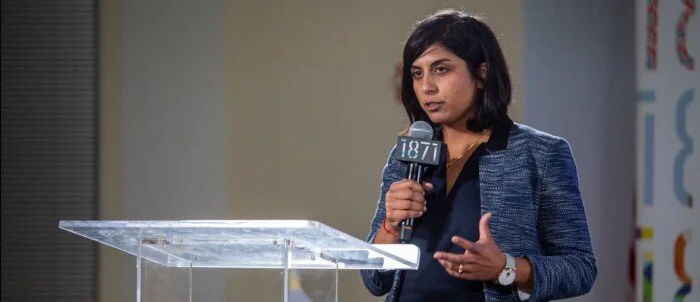In last month’s newsletter, we reflected on the fear and violence rippling around the world. Despite the year’s challenges, we are hopeful that 2024 will bring new waves of opportunity to make the world a better place. Optimism is one of our values here at Impact Engine, and one we find crucial to be intentional about, especially during trying times. As this year comes to an end and a new one begins, we are sharing some of our optimism with you, and support you to find your own.
Ander Iruretagoyena: In times of conflict, there remains a powerful reason for optimism as exemplified by the remarkable ability of humans to unite despite differences. This was vividly demonstrated during my wedding this past October, where my Mexican family and my wife's American family came together seamlessly, transcending cultural disparities and celebrating our shared values of love and unity. The event served as a poignant reminder that, even in the face of broader societal conflicts, the fundamental human capacity for understanding and acceptance can prevail. It reflects the potential for collective harmony when individuals focus on shared humanity, fostering connections that go beyond borders, backgrounds, and divisions, ultimately paving the way for a more hopeful and inclusive future.
Anna Reilly: I am optimistic about the future for female investors and founders. While the negative statistics around investing/financing for women are often called out (and necessary to be aware of and act upon), I have been encouraged by the number and the quality of conversations I have had with both female investors and founders in the past couple of months. The women I have spoken to, or in some cases read about, are building increasingly essential, incredibly unique investment firms and companies. These interactions have ranged from a super-sharp fellow education investor’s willingness to connect after a cold outreach to hearing about a former physician’s mission to make healthcare more accessible in rural Kentucky. It is these conversations combined with my own experience as an investor, where I have been empowered by both my male and female colleagues and connections, that fuel my optimism for a more diverse future for both investing and founding.
Cara Wood: The arts make me optimistic. I’m naturally a numbers person, numbers and processes are the way I best know how to enter the world and help the team. These things can be beautiful too, but often I discover more realities than dreams. The arts help me remember the beauty in the world when I am tempted to be overcome by grief from all of the wrongs I’d like to right. I can think back to the first time I heard Cynthia Erivo sing “I’m Here” in the musical The Color Purple, or I remember how captivated I was the first time I went to the Musee d’Orsay, or the levity and connection I felt listening to Trevor Noah’s memoir on audio book. All these things were reprieves from the stresses I was experiencing in daily life, but more recently I have been touched and pushed to dream by the art being created within the hardships. The poems coming out of Gaza and the art I see on social media or on the walls of buildings that allow people to share their support or remembrance for people they love. These are not a step away from real life, rather they create a way through. I still hold my memories dear, but I am using this more recent art as a catalyst to keep fighting for the things I believe in and to not lose sight of beauty still being created while we work for a better future.
Chris Wu: The record setting level of participation, and the amount of new pledges, at COP28 give me hope and optimism. While certain aspects of COP can be frustrating and is not without controversy, this year’s event drew over 100K attendees and mobilized over $57B in its first four days. In particular, stories from folks that were on the ground and in the meetings, like this one from Dawn Lippert on LinkedIn, only reinforce that hope: “Momentum is built in moments. On Sunday from 10pm-1am I had 3 hours of the most electrifying climate conversations that I can remember. CEOs, investors, and leaders of major agencies seemed animated with a sense of purpose. This electric energy and quest for ambition has already influenced major decisions that will never be reported in official COP commitments.”
Jessica Droste Yagan: I’m optimistic that what we each choose to do with our time and money matters. It’s so easy to feel like whatever I do is inconsequential and will be meaningless against the giant challenges we face in the world. But then I look around and notice every single good thing, every single thing moving in the right direction is happening because of the individuals who chose to act positively. From the woman I met last week pushing her state pension toward deeper engagement with public corporations, to the industrial manufacturing company board member I spoke to last month who is pushing her board to ask questions about supply chain impacts, to my mom and her friends who decided their county of 21,000 people in rural Illinois should have an Arts Council and so started one. It all matters. That gives me the energy to wake up every day and do the things I can do to inch humanity forward - perhaps imperceptibly in the scheme of the universe, but it matters!
Leslie Polster: I feel hopeful and optimistic about humanity. I’ve been listening to an NPR podcast called My Unsung Hero that shares short stories of simple acts of kindness that leave lifelong impressions. For example, there was a story about an English teacher’s response to a stuttering student that ended up changing that student’s life, a mother traveling through the airport with her 3 kids who was assisted by a stranger that noticed she was struggling, a trash collector going out of his way to tell a man who recently lost his mother that she was the nicest person in their route. These stories of humans helping and being kind to one another–without an expectation of receiving something in return–give me faith in the inherent goodness in human nature.
Maggie Stohler: I'm optimistic about the power of collective action. Prior to joining the Impact Engine team earlier this year, I spent four years working closely with Catholic and faith-based institutional investors who were aligning their investment portfolios with their faith values and moving more capital into social and environmentally impactful investments. I met many different communities of impact-focused investors, and their work gives me great hope about creating systems-level change. No group demonstrated the power of collective action better than the nuns. Initiatives like the Religious Communities Impact Fund, a group of 32 Catholic women’s religious congregations that allocate capital to economic justice debt and equity investments, and the Climate Solutions Fund, a group of 16 congregations of Dominican sisters who pooled together $130 million to invest in financing climate change solutions, remind me that there is transformative power in collaboration!
Priya Parrish: I believe that the success of impact investing as a movement will be largely driven by the talent behind it, and the quality I've seen come into our field this year gives me confidence in our future. This month, I finished teaching my annual impact investing course at the University of Chicago Booth School of Business, and was taken aback by the shift in students who come into business school already knowledgeable about impact investing. The rigor and creativity I saw these MBA students put into their final projects, the design of their own impact funds, grew tremendously compared to prior years. Imagine what the field will look like ~10 years from now when they are the leaders! It's true, the demand for impact investments continues to grow even in a tough fundraising year, yet the real story is the supply side of investors.
Rahul Bhide: In the backdrop of increased income and wealth inequality, as well as other sustained economic pressures, it was heartening to see the number of conversations this year focused on ‘impact’ in some shape or form across conferences and events, even in spaces that have not traditionally focused on it.
Roger Liew: It’s been a challenging couple of years in the startup space as capital became harder to come by. I’m buoyed by the progress many of our portfolio companies have made in tough times. For example, PadSplit was featured in the New York Times by Nicolas Kristoff as “The Old New Way to Provide Cheap Housing,” and BookNook published research results that certified their literacy product as ESSA Level 1 which “represents the strongest level of evidence and, therefore, the strongest level of confidence that a strategy will work”.
Sophia Friedman: While we are inundated with negative news cycles and so much suffering in the world, my role in health equity reminds me every day of recent breakthroughs and innovations in healthcare. 2023 saw several new product approvals in the US, offering treatments for diseases that previously had few treatment options. These include (amongst others): The approval of the first CRISPR/Cas9 gene editing therapy to target sickle cell disease - a major advancement in the field of gene therapy and a first for this disease state where there is significant unmet need and few treatment options. The first FDA approved RSV vaccine for expectant mothers aimed at protecting their unborn babies. The Alzheimer’s drug lecanemab won full FDA approval and clinical trials showed that the drug slowed cognitive decline by ~30% over 18 months. The first oral pill to treat postpartum depression became available by prescription in the United States. It’s incredible to think about the progress made this year - some have even called this the ‘golden age’ of medicine - and is inspiring to think about what new advancements might be made another year from now.
Tasha Seitz: This has been a tough year in private markets, but despite the headwinds, I remain optimistic. Having managed through several challenging economic environments during my career as an investor, I have seen well-run companies survive — and even thrive — during difficult times. I’m thankful to be surrounded by talented teammates, entrepreneurial leaders and fund managers committed to building businesses that improve economic opportunity, health equity and environmental sustainability. They inspire me and fuel my optimism about the future!












